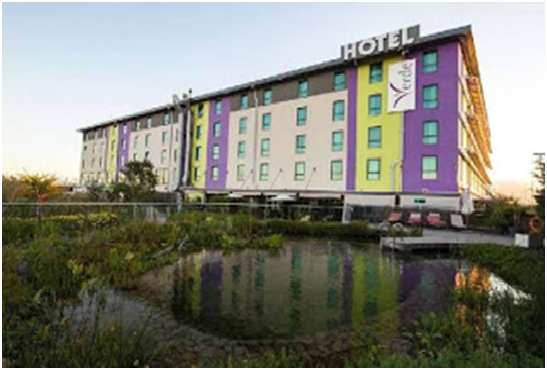Sustainability Management School
Sustainability Management School (SUMAS) is a unique, private business university located in Gland, Switzerland. SUMAS offers innovative business programs integrated with state of the art sustainability knowledge and combines high level academic education with projects in partnership with global companies. SUMAS' aim is to educate socially responsible global decision makers of the future who will make a real difference in the world. Its purpose is to deliver an innovative academic mix of sound business knowledge and a deep understanding of sustainable development.
Why The World Needs Sustainability Reporting

Corporate legacy has created much of the climate issues we are facing today. For far too long, companies have been able to operate without levels of accountability. This has brought about the devastating social and environmental damages we are seeing more than ever before.
It is now more necessary than ever for corporations to be held accountable for more than mere financial performance. Consumers are increasingly no longer interested in supporting companies that are only out for their own profit margins.
Companies are also already coming up against regulatory changes, externality taxes and higher demands on corporate responsibility and transparency. As such stakeholders and investors are looking for the same level of sustainable alignment.
Why is sustainability reporting important?
- It helps to track environmental, social and governance (ESG) performance which gives businesses a better understanding of where they need to improve
- It promotes transparency and accountability with customer bases and stakeholders, which can also assist in building trust in the brand in question
- It opens doorways for optimization in sustainable development, in turn changing companies and businesses into tools to positively impact our world
- It communicates to stakeholders and investors that a corporation has intentions for long term sustainable progress
- It ensures that the environmental, social and governance (ESG) gains are strengthened and intentionally pursued
- It incentivises better practices by rewarding the companies that are performing strongly on corporate sustainability inclusion
- By making sustainability a priority, companies can actually avert potential financial risk. According to the World Economic Forum Global Risks Report released in 2018, almost half of all significant business risks are environmental.
As a society we cannot improve, prevent and successfully manage that which we do not completely understand. Just like a neighborhood can’t accurately curb and assist with crime prevention if the crimes aren’t reported, so too businesses can not improve themselves if they don’t attempt participation in the conversation towards sustainable transparency.
Companies that wish to make a genuine impact and experience a truer definition of value contribution need to utilize the various sustainability reporting frameworks currently available to their advantage.
Understanding the different frameworks
According to Greenbiz, a media and events company that advances the opportunities at the intersection of business, technology and sustainability, there are five main reporting frameworks to consider:
- CDP (Carbon Disclosure Project)
- DJSI (Dow Jones Sustainability indexes
- GRI (Global reporting initiative)
- GRESB (Global Real Estate Sustainability Benchmark)
- SASB (Sustainability Accounting Standards Board)
Greenbiz also put together this useful graphic on the comparisons between these different frameworks.

Still, in order for a business to provide the most efficient feedback, they need to focus on giving material clarity on aspects relevant to them.
For this the Reporting Exchange is a valuable tool.
The Reporting Exchange is a global knowledge platform and resource for corporate sustainability reporting. It was established by the World Business Council for Sustainable Development (WBCSD) in conjunction with the Climate Disclosure Standards Board and Ecodesk.
Its primary goal is to bring “coherence and clarity to the global reporting landscape” in what is still currently an emerging and multi-faceted field of complex requirements.
It levels the playing field by:
- introducing common language and definitions
- identifies relationships between requirements and reporting resources
- highlights what is relevant to the specific business model
By understanding that the many frameworks available aren’t mutually exclusive but rather support each other, companies who focus on the reporting frameworks that offer material clarity to their unique operations will provide the most valuable picture of transparency.
The clearer businesses are able to communicate their sustainability impact in formats relevant to their interested parties the sooner they will be able to meet business objectives and grow as truly sustainable companies, and the sooner the collective landscape can benefit, learn and share on the exchange of experience and amassed knowledge.
The Need Of Sustainability Degree - PDF
Universities are there to focus on sustainability education, valuable to go ahead in modern world. Online Sustainability Degree is the key to enter into direct professions like business, construction, also in government sectors. Every year there is an ongoing opportunity to get hired in MNCs through sustainability courses in news luxury. Get a brief introduction about the Sustainability Courses Online from top European school.

“The hotel industry must reduce its carbon emissions by 66% by 2030 and 90% by 2050.” This was the finding of a study commissioned by the International Tourism Partnership in 2017.
The study highlights the urgent need for the hotel industry to drastically reduce carbon emissions in order to align with science-based targets to keep global heating below the 2 ̊C threshold and avoid run-away climate change.
Historically, the hospitality sector has had a substantial environmental footprint not only through its energy and carbon impact but also through water consumption, as well as the use of consumable and durable goods and hazardous waste creation.
According to Dana Communications “Hotels consume energy for HVAC operations, lighting, fuel and other power needs. Water is used for bathrooms, F&B [food and beverage], and laundry, as well as other general operations (irrigation, cleaning and maintenance). Waste is generated by the disposal of paper, batteries, bulbs, furniture, equipment, appliances and more.”
As such, there is an evident and increasingly urgent need for sustainable hospitality practices.
What is Sustainable Hospitality?
According to André Harms, sustainability consultant, founder of Ecolution Consulting and recent SUMAS guest lecturer: “Sustainable hospitality means rethinking hospitality as a sustainable practice. It means that every aspect of the hospitality industry is considered through the lens of sustainability. From design to construction/refurbishment to operation both internally in terms of consumption and behavior as well as externally in terms of procurement communications and commitments, etc.”
Harms were the lead sustainability consultant for one of the greenest hotels in the world: Hotel Verde based in Cape Town, South Africa. The hotel is the first hotel in the world to have been certified by the United States Green Building Council with a Double LEED platinum certification for both design + construction and operation.

“Hotel Verde has a vast array of passive, technical and operational interventions which make it more sustainable,” says Harms. These include:
- Energy efficient design
- 220 Solar panels
- 3 vertical axis wind turbines
- A highly efficient HVAC coupled to a geothermal loop system which draws energy from the ground
- Regenerative drive elevators and
- Grey water recycling system
- Low-flow tap fittings and showerheads
- Waterwise landscaping and drip irrigation
- An operational materials management plan (for more sustainable procurement and waste reduction) coupled to strict waste separation and upcycling, donation, composting and recycling practices. The hotel diverts over 5% of waste from landfill on average
- Sustainability interwoven into all hotel standard operating practices/procedures
- Biodiversity management and eco pool
- Employee engagement programmes
- A carbon neutral hotel experience to guests by offsetting the remaining impact on behalf of the guest.
“Hotel Verde really is a prime example of what can be achieved when it comes to Sustainable Hospitality” says Harms, who lectured as part of the SUMAS Sustainable Hospitality Management programs. “As the need for more urgent sustainable action becomes increasingly prevalent, it is my hope that the best practices that have been achieved with Hotel Verde will soon become standard practice for hotels all around the world.”
Sustainable Hospitality at SUMAS
If you are interested in a career in sustainable hospitality, SUMAS offers a variety of programmes. Browse the programmes below or contact us today for more information.
Bachelor Programs in Fashion Management Studies
There is a continuous evolution in the fashion industry. Be the top person with a rational brain in fashion with a Master's degree through proper Fashion Management Education. With entrepreneurship skills you can enhance more in creativity and other crafts. Master in fashion management consists of MA, MSc, and MBA. Most people prefer MBA to improve their business. The correct guidance and background knowledge is vast requirement to grow in fashion industry.
Fashion Bachelor Programs

Bachelor programs in Fashion Management Studies are essential stepping stones to achieve a successful career here. The usual four-year program is mandatory to go for master programs.
Fashion Universities concentrates on practical design techniques and knowledge as well as the creation of luxury fashion clothing. Most people think about Sustainable Fashion to note down and clarify the socio-economic aspects and the environmental impact. There is so much particular concept of sustainability in fashion. The high-quality standards and design are more successful when the rules of sustainability get fulfilled. While it is Worthing like a whopping price, master's degrees and creativity can lead you to many more opportunities. Based on your qualifications, you will get research work, business projects and many other working opportunities in fashion. In today's fast-paced business world, it pays to be up-to-date with the latest management techniques – and to be confident in your ability to apply them effectively. SUMAS short term professional courses in Switzerland aim to help you achieve that.
Best Sustainability And Professional Courses In Switzerland
Sustainability is the correct method of providing human beings the ability of development and basic needs in living without hampering the natural resources. The free courses online bring a real focus on environmental protection through the usage of renewable energy and sustainable development. Get a brief introduction about the Sustainability Courses Online from top universities in Europe. An individual and advanced effort is there to guide you in sustainability programs and some useful social events.
Why Sustainable Schools?
Education is the vast element to justify the sustainable goals and plan the action and bring it into prosperity to develop an agile learning environment. The need for converting the bookish knowledge into correct response is the theme of the best Business Schools in Switzerland. For future evolution student should have proper educational guidance, organization rules and regulations, physical appearance of the environmental objects, and their consequences. Students are giving their best in business schools to expect future crucial developmental researches.
The Swiss Developmental School
Get in touch with the Swiss Sustainable schools to gain knowledge of higher education. These are all here to cater the need for future growth and challenges. Before going to master programs, prerequisite is the bachelor program which set all the knowledge for the student. It is open to all the students over the world to get the scholarship to study in the Swiss schools.
Top Sustainability Podcasts
Sustainability is there to turn our head into ultimate protection as well as development on our planet. Get into the debate among the green thinkers to deepen your knowledge into the next level on global sustainability. Some Best Sustainability Podcasts directly focus on the field of business, science or many more activities. The HBR Review is special podcast to feature in business management. ‘The Sustainability Agenda’ arrange interviews to attract leading suitability person among the top universities. Energy-related all the agendas and actions must be fulfilled through the help of ‘The Energy Gang.’
The Need Of Sustainability Degree
Universities are there to focus on sustainability education, valuable to go ahead in modern world. Online Sustainability Degree is the key to enter into direct professions like business, construction, also in government sectors. While online degrees give the facility to the students based on flexible study, college choice is on your regardless any issues. Every year there is an ongoing opportunity to get hired in MNCs through sustainability courses. The career goals have a massive scope in this field.
After the successful completion of a bachelor’s degree, students can choose Online Masters Programs Switzerland. The master's degree in sustainability may improve the job profile and open certain prospects to bring successful career. Students who want to get proper knowledge in their respective fields must have some internship for one or two years.
About Sustainability Management School:-
Sustainability Management School (SUMAS) is the first ever business school to launch high-level academic education in Sustainability and Management. Visit- https://sumas.ch/ and find out more information about online programs in Switzerland.
Interview with Miruna Manole, a SUMAS graduate in Sustainable Luxury

The sectors of luxury fashion and hospitality can wield massive influence over their customers, who in many cases can be fairly influential in their own capacities. How-ever both these industries rank high as significant contributors to unsustainable environmental practices.
Integrating responsible leadership in the sectors of fashion and luxury is crucial to a world where the use of luxury brands doesn’t come at the cost of our environment. SUMAS graduate programs in Sustainable Fashion Management and Sustainable Hospitality Management, offer cutting-edge curriculums aimed at doing just that:
- MBA in Sustainable Fashion Management
- MBA in Sustainable Hospitality Management
- MAM in Sustainable Fashion Management
- MAM in Sustainable Hospitality Management
Miruna Manole is an MA in Sustainable Luxury Management graduate from SUMAS currently working as a Non-Financial Analyst at The CSR Agency (Bucharest, Romania)
She’s also achieved a First Class Degree with Honours in BA Fashion Management & Marketing from the University for the Creative Arts, UK.
Here, she shares what motivates her towards positive change, her views on youth lead climate action and how to navigate things when it feels overwhelming.
Give us a little background on how or why you chose to pursue the MAM in Sustainable Luxury and what that is for people who aren't familiar with the field?
While working on my final major project for my bachelor, I did a lot of research and learned that the fashion industry is one of the most polluting industries in the world. Given the state of the planet, I realised that I could not create a business plan that would have a negative impact on the environment, hence I decided to focus on creating a sustainable business.
This is how I discovered it was a passion of mine, while the real need for this subject was confirmed by me winning the New Business Award at Graduate Fashion Week, in London.
I decided to further my knowledge on the subject and pursue the MAM in Sustainable Luxury at SUMAS.
As one of my professors at SUMAS put it, sustainable luxury is luxury that blends ethics and aesthetics.
Therefore, it is represented by beautiful, high-quality products that are created without compromising the health of the people and environment which contribute to their creation.
Can you tell us a little bit about where you're currently working and how sustainable luxury plays a role?
I currently have the role of Non-Financial Analyst at The CSR Agency, a consultancy company that focuses on sustainability. I work in sustainability reporting, so while the role is not strictly related to sustainable luxury, the courses I undertook while studying at SUMAS prepared me for the job, especially ‘Responsible Management’, where I learned about CSR (Corporate Social Responsibility) and CSR reporting.
You wouldn't have chosen this field if you didn't have hope for a positive long term outcome to the environmental crisis. Can you speak to what it is that gives you motivation and belief in change?
There is a quote by Barack Obama that really spoke to me when I first read it: “We are the first generation to feel the effect of climate change and the last generation who can do something about it.” The situation regarding climate change is serious and we have already started seeing the effects. It’s so serious in fact, that it has been suggested to use the term ‘climate emergency’.
However, scientists are telling us we still have time to act in order to make sure the future generations can enjoy good, healthy lives. I do have hope for a positive long term outcome, because we can already see people changing habits, companies responding to increasing pressure from consumers and governments coming together and collaborating for this cause.
My motivation is earth. We live on a beautiful planet and I hope we get to enjoy it for as long as possible.
What are your thoughts on the youth taking leadership on Climate Action?
I admire my peers and the younger generations for their determination. The youth is going to be most affected by the effects of the climate emergency, so I completely understand their anger, when they see the older generations not acting up fast enough and, in a way, stealing their chances of a good future life.
Were you involved in the initial or any following #ClimateStrikes and if so to what degree?
I have been following Greta Thunberg since the beginning of Fridays for Future and have attended the Climate Strike whenever possible, while I was living in Geneva. The turnout was impressive and we can already see that these actions are bringing positive results, including raising awareness.
What outcomes were you hoping for, specific immediate ones as well as ongoing ones?
The first result is raising awareness, which we still need to continue doing. Others include creating policies aiding the move to a more sustainable version of our society, regulating some of the largely used products and encouraging the shift towards alternatives, which can only happen with the support of the authorities.
Do you believe that youth-lead strikes are the most powerful way to motivate authorities to take notice on this issue?
Considering that Greta Thunberg started these strikes alone and is now giving speeches at important events regarding the issue, which comes as a result of millions of people joining her movement, we cannot deny that they are a powerful way to motivate authorities. In the end, authorities are there in the interest of their people and when they forget that, it is no surprise that people feel the need to remind them of this.
What is your take away advice to anyone who feels the climate crisis is an insurmountable issue?
My advice is to start small through individual positive changes. I believe this will inspire people, which in the end will put more pressure on authorities and companies. I also suggest reading positive news regarding the issue, which is increasingly present worldwide.
In the end, if we all try to lead better lives, no matter if the issue is indeed insurmountable, we can be satisfied that we have lead our lives being kind to each other and our home.
And I believe that is quite an important feeling to have.
If you are interested in studying in the area of sustainable tourism or sustainable fashion, take a look at some of our available courses and degrees.
News of Sustainable Luxury and Fashion Switzerland
SUMAS offers MBA and MAM in Sustainable News luxury. We relate to all kinds of luxury brands, from fashion to hospitality. Read more from https://sumas.ch/the-future-of-sustainable-luxury/
Nine Sustainable Innovations set to Improve our Futures
As the battle on climate change increases, more and more overwhelming statistics and foreboding scientific data fill our feeds. Feeling despondent to it all is an understandable side effect. However, on the flip side of potential environmental catastrophe lies the innovation that could bring it, and therefore us, back from the brink. Here are 9 sustainable innovations in food waste, ocean pollution, water-scarcity and plastic manufacture set to shape our lives and improve our futures.
Cleaning up our oceanic act of unkindness
It is estimated that close on 13 tons of plastic pollution is dumped into our oceans each year, causing harm to not only our own health, but that of marine biodiversity too. These ocean-geared innovations are combatting the plastic soup.
1. Boat-fixed turbines collect plastic en-route
By far the biggest portion of plastic waste is dumped in rivers. A young Ecuadorian innovator, Inty Grønneberg, has designed turbines capable of filtering and collecting plastic waste before it ends up in the ocean. Installed on any boat, they are able to collect up to 80 tons of plastic during navigation. His innovation is focused on not requiring new infrastructure and vessels but rather to make the most use of as many existing boats as possible.
2. Bins for emptying ocean trash
Surfers, Andrew Turton and Pete Ceglinski invented the Seabin, submersible bins with fitted pumps capable of sifting the water and trapping the floating pollutants like plastic, detergent and oil. The bins only need to be emptied once per month.
Food industry transformations through AI and intelligent plants
Half the world’s food harvest is wasted due to fruit and veg being so susceptible to pathogens. Take into consideration the greatly reduced pollinating powers of our declining bee population and you could see where, without innovative thinking like this, we would be facing an increased severity of food shortages and waste.
1. Droid bees doing the heavy lifting pollination
Researchers at the University of Warsaw have created robotic bees, or B-Droids, who could help in boosting the bee population by taking up the tasks of low-nutritional and high-labour pollinating. Their concept is a managing platform and ‘swarm’ of autonomous and semi-autonomous robotic bees, who could identify crops and pollinate them effectively.
2. Blockchain eliminating food waste
Part of IBM’s research arm, ‘5 in 5 innovations’, works on 5 AI technologies that can be implemented in the next 5 years. One of these innovations calls for a future where blockchain, AI and IoT devices work together to eliminate the costly wastage and losses in the food supply chain. By collecting and sharing this data within the grocery supply chain, planting, ordering and shipment can be calculated to exact quantities, resulting in reduced waste and fresher food for the consumer.
3. Plant-based preservative cuts out cold storage
Demetra, founded by Italian start-up Green Code, is a 100% plant-based preservative that not only improves the shelf life of fresh produce but could also eliminate cold-storage during transit, thereby simultaneously saving on energy.
Intelligent plastics made from waste and wasteful emissions
Scientists estimate that there may be around 5.25 trillion macro and microplastic floating in the vast oceans. While arising technologies that sifon out this harmful plastic solve one half of the problem, other innovators are creating better plastics that will prevent it from occurring again in the future.
1. Bio-plastic from the humble avo-pip
Mexican chemical engineer, Scott Munguia, has engineered a plastic from a biopolymer he’s discovered inside the pip of an avocado. The single use cutlery made from his bioplastic biodegrades in 240 days. Most notably, this bioplastic is not only manufactured from a previously discarded food item – an estimated 300,000 tons are discarded annually in Mexico alone, but also not manufactured from a food source crop like corn, cassava or sugarcane.
2. Greenhouse gases become profitable plastics
Carbon capture and storage (CCS) technology makes it possible for carbon to be captured and compressed at the source, where it can then be moved to storage. While this technology can significantly reduce green-house gasses, it is now also being used profitably to make products.
AirCarbon is a verified carbon-negative material that can be used to manufacture everyday products, that would have otherwise used fossil fuels and oil, by combining the sequestered carbon with oxygen. The entire manufacturing process is carbon negative.
Water-wiser engineering
30-40% of the world will face water scarcity by 2020. As a climate-change exacerbated reality, 1.8 billion people will live in regions of water scarcity by 2025. This not only affects fresh drinking water but the ability to grow food. This innovative thinking could help.
1. Growing plants in the desert
The Groasis Waterboxx makes growing crops in an intelligent plant device that germinates, incubates and waters saplings possible. It also has a 90% less water requirement than traditional methods.
2. Drinking water from clouds
For coastal and mountainous areas with less access to clean drinking water, a 3D mesh innovated by CloudFisher can convert the fog into safe drinking water while withstanding winds of 120 kmp/h. The design is an improved-upon innovation on the first fog collectors installed in Eritrea in 2007.
Best Sustainability And Professional Courses In Switzerland
| The need for converting the bookish knowledge into correct response is the theme of the best Business Schools in Switzerland. For future evolution student should have proper educational guidance, organization rules and regulations, physical appearance of the environmental objects, and their consequences. Get in touch with the Swiss Sustainable schools to gain knowledge of higher education. |
What Are Sustainability Courses Their Significance And Demand
These are the times when people are often talking about massive global climatic changes, huge adversities that await the nature and the mankind population of the world and the various ways we can arrest the progress of environmental dilapidation. Hence these are the times when business endeavors of the current times and also of the future must amalgamate with endeavors of sustainable growth that will balance the economic growth with proper maintenance of the environment of the world. This is what is fostered by the sustainability schools. The top business schools in Switzerland just as in other parts of the world are encouraging people to take up their sustainability courses online providing the best sustainability podcasts, online masters in sustainable tourism, online DBA programs etc so attract a larger number of students to these online MBA programs in Switzerland.
Significance
The best business schools in Switzerland through their online sustainability degree is fostering an education amongst the young and the talented regarding the best sustainable growth that can be brought about, the best uses of renewable energy, effective supply chain management, energy management in buildings, improvement of international energy security, food production on effective energy intensity. The professional courses in Switzerland providing DBA courses ensures that the students gets an in depth knowledge in a large number of aspects such as a responsible attitude towards the environment, the best use of the available raw material, looking for fresh sources of raw material, management of greenhouse emission, management of risk from not just the company and its people but the environment, the general society and its members. The European Universities are harping very strongly ion the utility of these sustainability courses for the students who study in Europe. This is one of the best ways the top European schools and the top European Universities can make responsible and successful business fraternity in the future.
Demand In The Market
The degree of masters in business administration had a huge demand in the world of employment. However in the recent times the companies have come to acknowledge the importance of employees who understand the importance of sustainable development of the company, the society and their own profiles. This is where the demand of these degrees escalates all the more.
Apart from the business fraternity even the best fashion management education, the fashion universities have also come to understand the importance of sustainability degree. The fashion universities of Europe are looking for fashion outbursts that respect the environment around them just as much. This is what is known as sustainable fashion where luxury and fashion is also done in a responsible manner without hurting the other elements of Mother Nature of the planet.
About Sustainability Management School:-
Sustainability Management School (SUMAS) is the first ever business school to launch high-level academic education in Sustainability and Management. Visit- https://sumas.ch/ and find out more information about online programs in Switzerland.
SUMAS' aim is to educate socially responsible global decision makers of the future who will make a real difference in the world. Its purpose is to deliver an innovative academic mix of sound business knowledge and a deep understanding of sustainable development.
Interview with Giri Prasath, a SUMAS graduate and second year Internship scholar

The Sustainability Management School (SUMAS) in Switzerland is the first ever business school to offer high-level academic education in Sustainability and Management. Giri Prasath Rajarathinam is a second year student here with SUMAS.
Prior to his completing the MBA in Sustainability Management with SUMAS in Gland, Switzerland, he worked in financial auditing. He’s also achieved a Bachelor of Commerce degree from the PSG college of Arts & Science, India.
Here, he shares his journey in sustainability management and thoughts on youth lead climate action.
Why did you choose to pursue the MBA in Sustainability Management? Was there an experience that made it clear this was what you wanted to dedicate your life's work to?
My journey with the environment began at The Laidlaw Memorial School & Junior College in Nilgiris, India, where environmental education was compulsory from the seventh grade. Living there in a valley surrounded by greenery and a pollution free environment for twelve years, is what made me take a greater and stronger stand for the environment.
I dropped mathematics in the eleventh grade to take environmental science, even though I already had environmental education as a mandatory subject. This lead to my choosing sustainability, as it had all three pillars – economic, environmental and social.
Can you share an overview of the international requirements of sustainability management?
Globally, at present, the number of businesses integrating sustainable practices and policies as part of their day to day activities and business operations has been at an all-time high since the signing of the Paris agreement.
Although the science behind climate change and sustainability is technical and more suited for a person with an engineering background, companies also need people with business and management backgrounds who understand these policies and know how to integrate them from board-room level to ground force.
Integration is where sustainability management graduates come in.
Sustainability is in high demand in these industries:
- Textile
- Agriculture
- Finance
- Raw material procurement
- Business design
- Policy making
- Healthcare
You wouldn't be in this field if you didn't have hope for a positive long-term outcome to the environmental crisis. Can you speak to what gives you motivation and belief in change?
The definition of sustainability says “Meeting the needs of the present without compromising the ability of future generations to meet their needs”.
What do they mean by “future generations”? In my opinion humankind thinks as far as four generations into the future. That may account for a maximum of two hundred to two hundred and fifty years.
Research already says that we have emitted enough Greenhouse gases (GHGs) into the atmosphere, which will go on to have its effect for the next hundred years minimum, even if we stop using conventional fuels right now.
At the current rate of humans’ switch to renewable sources of energy, we will have the effects of climate change for the next three hundred plus years. For sustainability to reach every nook and corner of the globe, it will take at least another decade.
The so-called developed countries have been doing well with the switch to renewable energy and integrating sustainability practices in their businesses. But what about the under developed countries, where the most impact and change needs to happen?
This is where the long-term vision of sustainability comes into play. Even though the countries have signed the Paris agreement, they all have their own targets on a national level:
- to reduce GHGs
- switch to renewable energy sources
- make sustainable changes on all levels ranging from sectors to departments
These in addition are even longer term visions:
- Helping under developed countries achieve their targets through knowledge transfer
- Implementing cradle to cradle business models
- Initiating responsible investments (impact and thematic investing and climate bonds) from developed countries in a swift and efficient manner
The oil industry and capitalistic organisations are against the sustainability trend and therefore slow down the process.
The people who put them in power are demanding the change and that’s where my belief is vested – the people.
You're going on to do the second-year internship, correct? Can you share what your focus will be and why?
Yes, I have completed my MBA in Sustainability Management (1 year) and have continued to do the Professional Development Program (PDP) with Internship (1 year).
My focus is towards joining the finance sector.
Every organisation needs finance to run. If finance is invested in the right place impact created is two-fold.
If you cut out the inflow of money to these polluting organisations, they won’t be able to function and will switch to a more sustainable approach.
Companies are rated on the following factors (ESG):
- Environmental
- Social
- Governance
With the sustainable finance sector gaining traction day by day, you can now choose to invest based on which ESG factors align with the beliefs and themes where you would like to make an impact.
Investors are becoming aware of the climate emergency and are turning away from organisations that are promoting environmental destruction in favour to those taking these sustainability factors into account.
What are your thoughts on the youth taking leadership on Climate Action?
It has reassured my beliefs in the younger generation, clearly defining that they are willing to go out there and do what is necessary for change to happen. They have every right to go out there, seek answers and get the best for themselves, because if leaders do not take any action today, the younger generations are the ones next in line that are going to truly bear the brunt of climate change.
With role models like Greta Thunberg headlining the protests, more youth will be motivated to join for a cause which will do greater good.
Were you involved in any of the #ClimateStrikes?
I was a participant in three climate marches in Geneva that happened between February and April.
What outcomes were you hoping for, specific immediate ones as well as ongoing ones?
I really was hoping for governments to make changes on a legislative level, considering the support they would get (But yeah, that was a little too much of me to expect).
I am looking for more changes primarily in the switch to renewable energy (Public & Private) and transport sector (electric cars and electric grid buses).
In my opinion these sectors are where a lot can be done to help curb the current rate of GHG emissions.
Do you believe youth-lead strikes are the most powerful way to motivate authorities to take notice?
Yes, I do. Take Greta Thunberg for example. With her work, she has been able to give powerful speeches in front of global leaders within Europe and at the World Economic Forum in Davos.
As Greta Thunberg said and I quote “They see us as a threat because we’re having an impact”.
What is more powerful than youth having an impact on an issue that concerns the wellbeing of all humankind?
What is your take away advice to anyone who feels the climate crisis is an insurmountable issue?
Climbing Mt Everest before Edmund Hillary and Tenzing Norgay achieved it was an insurmountable task to many.
- Since the first ascent people have carefully studied the terrain and climatic factors before a successful summit.
- For the past two decades adventure companies now help you summit successfully.
- They all work together as a team - the local Sherpas, the experienced mountaineers and the client that are summiting.
The same steps need to be done for finding solutions for the climate crisis – we need to work together and assess our possibilities for a sustainable future from models created by scientist’ data.
That’s exactly what Sustainable Development Goal (SDGs) 17 says – Partnership for the Goals. The SDGs cover most of the issues that come under sustainability, partnering and working together, helps us learn to bring about peace and live in harmony.
Top Fashion Business Schools and Universities in Switzerland
SUMAS is the top level business Sustainable school to launch high-level academic education in Sustainability and Management for bachelors in Europe. Additionally, SUMAS provides Fashion management schools and Universities online in various master programs in Switzerland. Visit at https://sumas.ch/ for apply various courses.
Unpacking Sustainability Leadership in light of the Upcoming UN Summit

UN Secretary-General António Guterres is convening a summit to commence on the 21st of September 2019 in order to hold world leaders accountable to the goals set out in the Paris agreement and to raise collective ambition by increasing climate action goals. Guterres is calling on attending leaders to demonstrate climate action leadership by only giving leaders a platform to speak if they presented plans in line with the IPCC 1.5 °C report.
Meanwhile 16-year old climate activist Greta Thurnberg, who is also attending the summit, arrived in New York on the 28th of August, after a two-week journey on a carbon-free sailing boat. Adamant that she would not make the journey via jet fuel guzzling plane, Greta used the opportunity to display a different, but perhaps far more effective take on sustainable leadership. One that shows action speaking louder than speaking platforms.
The true definition of Sustainability leadership
Mary A. Ferdig offers a widely recognised description of sustainability leadership, often cited in scholarly works.
“Anyone who takes responsibility for understanding and acting upon complex sustainability challenges qualifies as a ‘sustainability leader’ whether or not they hold a formal leadership position or acknowledged political and social-economic influence.”
Greta Thurnberg, and many other youths, who aren’t yet old enough to own cars let alone businesses, are already displaying this understanding of sustainability leadership in the actions they’re taking toward speaking up for climate change.
The youth and sustainable leadership
The latter half of Mary A. Ferdig’s definition speaks to why the youth are so effective in their actions and also speaks to what effective world leaders will incorporate should they wish to be effective sustainable leaders. Namely that; ”rather than providing all of the answers, sustainability leaders create opportunities for people to come together and generate their own answers – to explore, learn, and devise a realistic course of action to address sustainability challenges.”
Many youths are already holding our leaders accountable to their plans and actions thus far. Take the group of youths who sued the American government for failing to protect them from the onset of climate change or the Parkland School shooting survivors in Florida, who in a matter of days, mobilised millions of supporters, thanks to Twitter, to march in protest of urgent need for gun control policies. Their action saw the first real gun legislation implemented in years.
Their drawing mass attention to the unsolved problems seems to be what sets change in motion, rather than arriving on a podium, answers in hand. By showing acknowledgement of value shifts with the vulnerability of not having all the answers inspires communities to connect and manifest change, which is by all accounts far more successful than playing the fear based denial card favoured by some world leaders.
Greta Thurnberg didn’t stand up at the World Economic Forum and tell business leaders the globe over how to optimise their actions to solve the entire climate crisis. She stood up and spoke openly about the fearful reality of not attempting to solve the crisis. She shared her fears. Fears that echoed collective truth and inspired the desire to be part of alleviating that fear.
What is needed from a sustainable leader?
Successful sustainability leadership can be carried out with the following approaches:
- Leading with society and the environment in mind
- Being driven by a keenness to learn, challenge and improve current situations
- Inspiring cooperation between sectors and cultures
- Setting the self aside and instead focusing on forging connections within communities to enhance their co-creation and co-production
- Casting light on as yet unanswered, but vitally important questions.
- Open-mindedness and integrity
How businesses and communities will benefit from sustainable leaders
Leaders who have faced and overcome adversity, or who, at the very least have experienced living in parts of the world where differing economic backgrounds are driving factors, are far more likely to develop socially and environmentally inclusive practices. This type of leadership paves the way for the upliftment and integration of communities. According to Global Citizen, a movement of engaged citizens who are using their collective voice to end extreme poverty, leaders with emotional ties and ethical responsibility are a high contributing factor to ending poverty by 2030.
The sustainable leadership displayed by the youths taking action, whether they hold political or social influence or not, didn’t necessarily come about because of sustainability leadership or environmental education.
Being inhabitants of this planet facing the climate threat is qualification enough to fight, what is at the heart of all things, a human rights threat.
But integrating their calls for collective social, business and political change is a complex issue. Individuals who hold a strong education in business sustainability management will be key assets in all future businesses.
Education in sustainability management is highly beneficial in preparing an individual emotionally in taking on the responsibility of navigating corporate and social change. In order to affect any meaningful change, leaders will need to view the systems of business and society as interlocking ecosystems within our environment.
The SUMAS Sustainability Management Business School of Switzerland aims at empowering students with the confidence to carry out this responsibility and make the decisions required to right the collective course. The programs focus on delivering sound business knowledge and an intrinsic understanding of sustainable development in an innovative way.
Why we need sustainable leadership
If the leadership of the world’s governments and organization thus far has shown us anything, it is that the advancement of a singular agenda without consideration of the environment that it transpires in is in and of itself an unsustainable pursuit.
We cannot be extricated from the societies we cohabit with or the environments we depend on. Therefor no achievement that comes about at the demise of any civilisation, culture or habitat can truly be considered an achievement.
The climate crisis no longer allows for leeway in this or any disregard of the acceptance of total interconnectedness.
Given this context, leaders of businesses, organisations or governments can no longer be considered leaders if they operate outside of the framework of sustainability.
Leadership without a focus on sustainability is not leadership at all.
If you are interested in using education to further your agenda of becoming a sustainability leader, take a look at the various programs that we offer.
Unpacking Sustainability Leadership in light of the Upcoming UN Summit
Anyone who takes responsibility for understanding and acting upon complex sustainability challenges qualifies as a ‘sustainability leader’ whether or not they hold a formal leadership position or acknowledged political and social-economic influence. The SUMAS Sustainability Management Business School of Switzerland aims at empowering students with the confidence to carry out this responsibility and make the decisions required to right the collective course.
The Future of Sustainable luxury

For more than a decade the concept of “sustainable luxury” has been afoot. Sustainable luxury can relate to all kinds of luxury brands, from fashion to hospitality. Rather than offering an “eco-friendly product seeking a premium image”, the idea of sustainable luxury is to embed sustainability values and practices into a luxury good or brand.
But can sustainability and luxury really go hand in hand?
According to an article on HuffPost, sustainable products “share the same ‘essential’ qualities of luxury goods.”
- They call for ‘extraordinary creativity and design’
- They must be made from ‘exceptional materials’
- They should be good quality and are often rare
More and more luxury brands around the world are adopting the concept of sustainable luxury in the hope to attract more discernible customers, improve their brand image, drive innovation and reduce risks associated with climate and ecological breakdown.
Whilst this has given rise to greenwashing, many luxury brands do or are starting to see sustainability as a core value integral to the way in which they operate. Gucci CEO, François-Henri Pinault, said: "My deep conviction that sustainability creates value is part of my strategic vision...Sustainability can – and must – give rise to new, highly ambitious business models and become a lever of competitiveness for our brands."
What about our planetary boundaries?
Within the past year, the critical climate and ecological crisis our planet is facing has become ever more apparent and it is clear that all parties, including luxury brands have not done enough to become sustainable.
Considering the science which now states we have very limited time to prevent further ecosystem collapse and global warming, luxury brands have no choice but to deepen their commitment to sustainability on all levels - and fast. Not only to do better by people and the planet but to increase their own resilience against these issues.
According to an article written in the 2019 Sustainable Hospitality Yearbook, “The global trend is moving towards full decarburization. Hotels...who do not prioritize climate mitigation will be left behind.” The same can really be said for any brand in the luxury sector.
Should we be rethinking luxury?
Our complex world is changing quickly and if we are to survive as a species, increase long-term business resilience in the luxury sector and restore what is left of the biosphere, we may need to rethink our definition of luxury altogether and redesign the industry to one that is restorative and promotes social equity.
If done right, sustainable luxury items will create minimal harm (to people and planet) and be designed and produced to last a lifetime. The item’s full life-cycle should be taken into account when produced so that the product does not fall prey to our current linear take-make-dispose model, but rather one of circular economy. In the case of hotels, or any built environment, every element of design, refurbishment and operation needs to be done with sustainability at its core - and with the intention of ending reliance on fossil fuels and becoming carbon neutral very soon.
Luxury brands also have a responsibility, as trendsetters in our current world, to communicate sustainability and the need for customers to “buy less” and “choose well” as fashion designer Vivienne Westwood says.
Interested in being at the forefront of sustainable luxury?
At SUMAS, we offer an MBA and MAM in Sustainable Fashion and Sustainable Hospitality. These programs are designed with cutting-edge curriculums aimed at integrating responsible leadership in the luxury sectors of Fashion and Hospitality.








